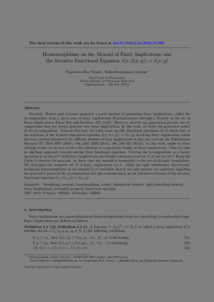Vemuri, N R and Jayaram, Balasubramaniam
(2015)
Homomorphisms on the monoid of fuzzy implications and the iterative functional equation I(x,I(x,y))=I(x,y).
Information Sciences, 298.
pp. 1-21.
ISSN 0020-0255
![[img]](http://raiithold.iith.ac.in/style/images/fileicons/text.png)  Preview |
|
Text (Author version post print)
Info-Sci_2014.pdf
- Accepted Version
Download (290kB)
|
Abstract
Recently, Vemuri and Jayaram proposed a novel method of generating fuzzy implications, called the ⊛⊛-composition, from a given pair of fuzzy implications [Representations through a Monoid on the set of Fuzzy Implications, Fuzzy Sets and Systems, 247, 51-67]. However, as with any generation process, the ⊛⊛-composition does not always generate new fuzzy implications. In this work, we study the generative power of the ⊛⊛-composition. Towards this end, we study some specific functional equations all of which lead to the solutions of the iterative functional equation I(x,I(x,y))=I(x,y)I(x,I(x,y))=I(x,y) involving fuzzy implications which has been studied extensively for different families of fuzzy implications in this very journal, see [Information Sciences 177, 2954–2970 (2007); 180, 2487–2497 (2010); 186, 209–221 (2012)]. In this work, unlike in other existing works, we do not restrict the solutions to a particular family of fuzzy implications. Thus we take an algebraic approach towards solving these functional equations. Viewing the ⊛⊛-composition as a binary operation ⊛⊛ on the set II of all fuzzy implications one obtains a monoid structure (I,⊛)(I,⊛) on the set II. From the Cayley’s theorem for monoids, we know that any monoid is isomorphic to the set of all right translations. We determine the complete set KK of fuzzy implications w.r.t. which the right translations also become semigroup homomorphisms on the monoid (I,⊛I,⊛) and show that KK not only answers our questions regarding the generative power of the ⊛⊛-composition but also contains many as yet unknown solutions of the iterative functional equation I(x,I(x,y))=I(x,y)I(x,I(x,y))=I(x,y).
Actions (login required)
 |
View Item |


 Altmetric
Altmetric Altmetric
Altmetric